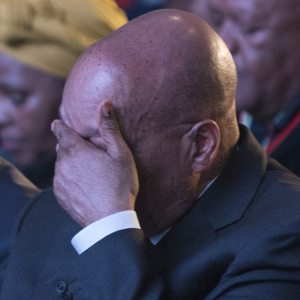Catholic bishops in South Africa have welcomed this week’s local election results, which were the worst in the history of the ruling African National Congress (ANC) party, which took power after the end of the apartheid.
Claims that the ANC would be in power “until the Second Coming” made by President Jacob Zuma are “crumbling”, Southern African Catholic Bishops’ Conference (SACBC) spokesman, Archbishop William Slattery of Pretoria told The Tablet. The results, showing a significant decline in ANC support, showed a “growing maturity” said Archbishop Slattery.
The ANC, the party that helped liberate South Africa from white minority rule two decades ago, has, historically, relied on the unyielding loyalty of the millions of black South Africans who lived under apartheid. The electorate is now showing a willingness to look beyond the liberation struggle credentials of the party, said the SACBC spokesman.
The ANC itself will be reflecting on whether President Jacob Zuma “is a plus or a negative factor”, he added.
In the biggest shake up of the nation’s post-apartheid political order, the ANC won just 54 per cent of the vote, losing key urban areas of Pretoria and Port Elizabeth. A decline in support for the ANC was seen in eight of the nation’s major cities, where a growing number of black middle class turned against the party in protest to the country’s stagnant economy and its leader’s brazen self-enrichment and erratic decisions.
Archbishop Slattery highlighted the issues that have led many voters to turn away from the ANC, referring to a bishops’ statement last month which called for ethical leadership in the face of “unemployment, the rising cost of living, household debt, lack of basic resources, the slow pace of service delivery, and high levels of crime”.
“We are now in an era which demands coalition government,” reflected Archbishop Slattery, arguing that greater involvement of the centre-right Democratic Alliance (DA), which took 27 per cent of the vote, and the radical Economic Freedom Fighters (EFF) with 8 per cent, would benefit the country.
The DA, which became the main beneficiary of widespread dissatisfaction in the country was, traditionally, the party led by white South Africans who opposed apartheid, but now has many young black leaders. Having retained Cape Town, the nation’s second-biggest city, with a landslide victory, the party now controls at least two of the nation’s eight biggest cities.
The interdenominational South African Council of Churches (SACC) commended the absence of street protests demanding a rejection of the results and of troops threatening the integrity of the country’s democracy.
The SACC also said that South Africa was entering a new phase for its constitutional democracy, “the age of coalition governance”. "Negotiation and compromise will have to be the way of doing business,” it said in a statement.




 Loading ...
Loading ...